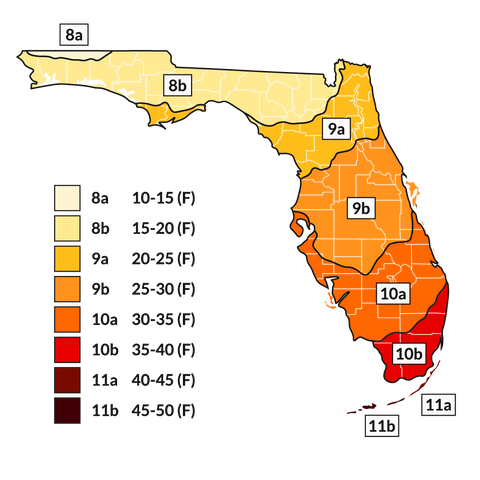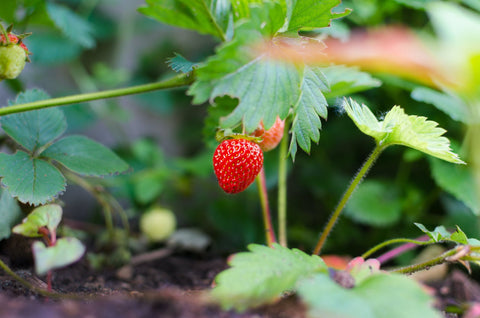
How To Find Your Florida Gardening Zones: With Map!
Share
Gardening in Florida is basically a religion. A combination of moisture, soil quality, and abundant sunshine make it ideal.
One of the most exciting things about growing plants in the Sunshine State is diversity. Different gardening zones provide the best conditions for a variety of greenery.
We’re looking at the different growing zones in Florida today. Once you understand yours, your brown thumb just might turn green!
What are hardiness zones?
Hardiness zones give gardeners and farmers a good idea of which plants will thrive in a given area. Across the country, there are 26 that subdivide regions by half a degree Fahrenheit. The average low temperatures in winter define each region.
In zone 1a, that means -60 to -55 degrees. Zone 11b, on the other hand, sees average temperatures of 65 to 70 degrees! Now, it’s important to note that grow zones only cover low temperatures. They don't include average high temps or humidity. California 9a and 9b is not the same as Florida 9a and 9b!
The hardiness zones that Florida contains
At the far southeastern tip of the United States, Florida holds four distinct hardiness zones. In the state, scientists have designated zones eight through eleven. The panhandle sees an average low of 10 to 15 degrees, while the Keys are a more temperate 45 to 50 in winter.
So, when you’re purchasing seedlings or seed packets at your local garden center, pay attention. Which hardiness zone you’re in can make all the difference!
General tips for planting within your gardening zone in Florida
There are few things more devastating than seeing your garden wilt. There aren’t a lot of variables you can control in nature. Planting for your zone, however, is one thing you can do to raise your chances of success.
Even if your garden thrives in the heat of summer, it’s winter you need to worry about. Planting in your zone protects your landscape, especially in a region where the growing season is year-round.
Consider your distance from bodies of water and how it affects climate
Depending on your proximity to large bodies of water, you’ll experience climate differently. Water generally heats and cools slower than land. So, if you’re close to the coast or a large lake, you’ll likely have cool weather in summer and warmer winters.
This moderate temperature zone experiences less variance than in areas away from the coast.
Create a microclimate within your garden to accommodate some plants
The best way to ensure success in your garden is to plan where plants will support each other. With the right arrangement, you can create microclimates that allow less cold hardy plants to thrive.
Container gardening is another effective way to manipulate the climate in your garden. Raised beds give you more control over soil composition and moisture. Additionally, you can increase the thermal mass of an area by concentrating topsoil in one spot.
The time of year you plant is just as important as your gardening zone
When you’re working with what seems like a year-round growing season, the time of year you plant matters. Some plants can survive colder weather once they’ve established themselves. If you’re putting seedlings out in winter temperatures, they likely won’t survive a cold snap.
Check with Whitwam Organics for the best time to put new seedlings in the ground. We may have some options you didn’t consider.
Other frequently asked questions about gardening zones in Florida
The USDA map is highly detailed and separates zones very precisely. However, you may still have questions. We’ve got answers to the most asked questions here for you!
How can you find your exact gardening zone?
Using the USDA map website, you can look up your gardening zone by zip code. Remember that even though one part of your community may be in one area, you might be in another. It all depends on factors like proximity to water or even how densely populated your city is.
How can the quality of your soil affect what you grow?
Poor-quality soil leads to poor-quality plants. Whether you’ve got high clay content or sandy soil, adding nutrients back makes a difference. Because they draw all of their nutrients from root systems, if there aren’t any, they can’t grow.
But there are ways you can enrich the earth where you plant. Plenty of natural fertilizers bring what your plants need to the party.
We love making our own compost, but that’s not practical for everyone. Instead, you can purchase some at your local plant center. Some city solid waste programs provide it at a reasonable price, too.
Used coffee grounds are great additives to the soil. Just make sure they’re not hot!
In Florida, liquid seaweed is easy to get ahold of. It comes in both liquid and powder form. For powder, you just have to add it to water to reconstitute.
Where can you buy plants that grow in your gardening zone?
The best place to buy plants perfect for your gardening zone is from Whitwam Organics! We’re likely to have plenty of region-specific seedlings ready to go. And, because of our national shopping availability, we can safely deliver your plants no matter what zone you’re in.

If you’re unsure whether a plant will survive the winter, simply check the label. Most will give you an indication of where they’ll thrive. Look for information like “Zones 8-11” when scoping it out. Some are even hyper-specific and include the “a” and “b” designations.
Whitwam Organics delivers live plants and seedlings directly to your garden!
At Whitwam Organics, our team can deliver to you! We even offer onsite consultations to help you plan your garden, if you’re local to the Tampa area. You can browse our online nursery and have plants shipped, delivered, or prepared for pickup.
Our greatest pride is educating you to make the best choices for your gardening zone. Check out our full line of plants and supplies on our website today!
Subscribe to our newsletter
Join our email list to keep up with our latest garden blogs, newest items, and seasonal specials.
